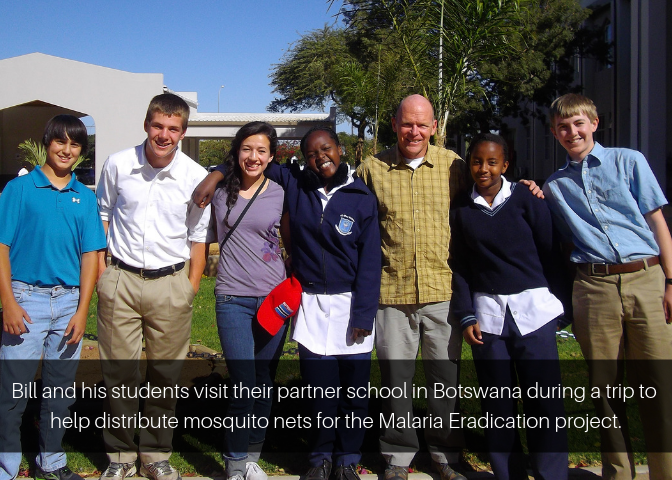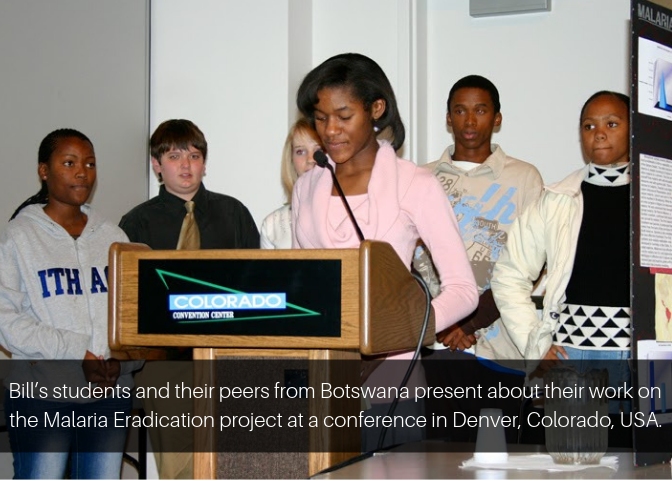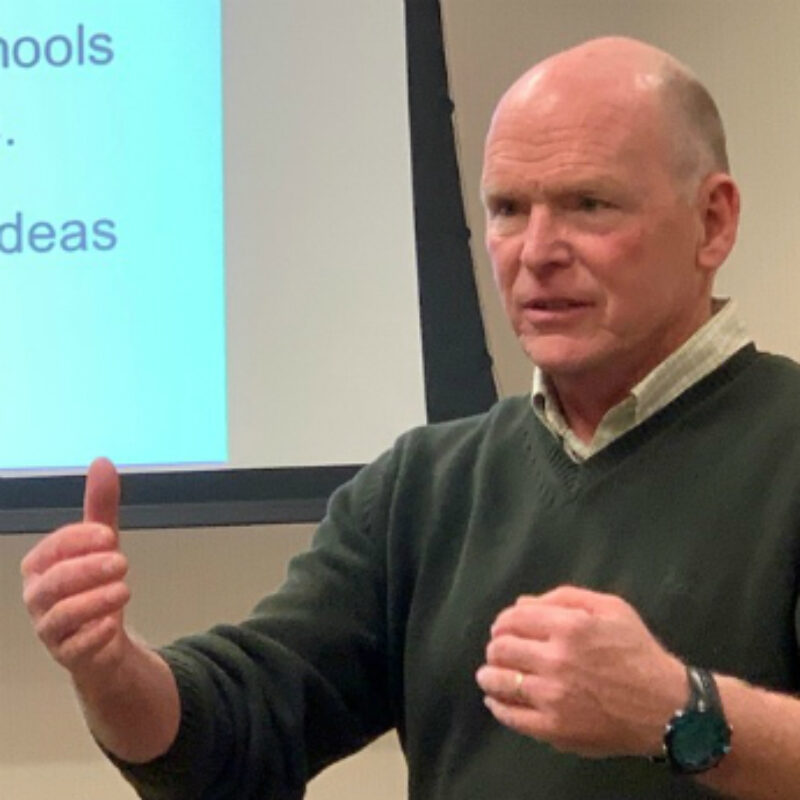iEARN-USA Educator Spotlight: Bill Meyers
Posted on March 01, 2019
iEARN-USA recently interviewed long-time iEARN Educator Bill Meyers. Read on to learn about Bill’s unique and impactful experiences with iEARN and why he engages his students in iEARN projects.
What subject(s) and grade level(s) do you teach, and where?
“When I first joined iEARN, I was teaching middle school Science at Alexander Dawson School in Lafayette, Colorado in the U.S. I’m currently teaching 6th - 8th grade Social Studies at Doral Academy of Colorado in Westminster, Colorado.”
When and how did you first become affiliated with iEARN?
“I first became involved with iEARN through a couple different global projects I was doing. As part of The Globe Program, an international Science organization, I met some teachers who did iEARN projects. I also went to a conference through Eno Environment Online and met Tommie Hamaluba, an iEARN teacher from Botswana. He and I started doing a project between our classes in ways to prevent malaria, and he thought it would be a good idea to do an iEARN project."

"We started the Malaria Eradication project in 2007 so other schools could join and continued through 2012. It was really fun and rewarding. My students would raise money to buy mosquito nets to send to Botswana to be distributed. I was able to go four times, three times with students. My students did all kinds of fundraisers at school and partnered with local businesses in order to raise their own funds to travel to Botswana and help distribute the mosquito nets that they had also raised money to buy. They stayed with host families there.”
Which iEARN projects have you participated in with your students, and with classes in which countries have you connected?
“I participate in ‘One Day in the Life’ at least once a year. We were one of the early schools to do this project and use it for field trips. I have found it useful for students to document their fieldwork and publish it on the Collaboration Centre, which gets them to be more focused and motivated. Most field trips have been geology-related, places where there are fossils and rock formations. Once we started sharing our work, other schools started doing similar work, such as in Taiwan.
I have also participated in ‘Water is Life,’ which is facilitated by iEARN Australia. It was really a nice semester-long project that was very rewarding for us. Especially interesting for us was that it was being run by a school in the Southern hemisphere. A lot of the work was done during our summer break. This made my students think about how much of the world is usually forced to run on our schedule. That seasonal idea is something they read about, but until they actually talk to someone in the Southern hemisphere, it doesn’t really click. One of the things that is so neat about iEARN is that everything is equal. There’s no one country that drives it."
“I think it’s just the fact that it makes the learning real. It’s not another worksheet, activity or reading. I can remind my students to do their best work because it’s going to be published. It’s motivating to them and makes them think, ‘I really should check my grammar and punctuation.’ One of the comments I get from students when we’re working with schools where English is a second language is, ‘they write so well;’ my students notice, and it motivates them.”
"Another project I’ve done is the ‘Solar Cooking’ project, in which my students posted pictures of the solar cooking ovens they made and saw those made by other kids. They cooked smores, and it was fun for them to see what others had cooked. Some of the schools posted temperatures they reached with their ovens, and then my students tried to reach those temperatures too.”
How did you first establish these connections with iEARN partner educators and classrooms around the world?
“I have connected with partners generally through joining a project and meeting them through that project. For example, the ‘Water is Life’ project went on for quite a while, so we got to know each other. Right now I’m involved with Learning Circles, which I have never done before. It fits really well with Social Studies and is a great way to meet others. The resources I currently have available are really limited for Social Studies, so I have been looking for outside materials to enhance my class and keep the kids interested. iEARN is a great place to look for that. In my Learning Circle, which is focused on Geography, we have schools from five different continents. It is so fascinating for my students to look at a map and see where the countries are from which the other kids are joining.
One of the things that’s so cool about these projects is that you find other like-minded teachers. For example, Nataliya Byzova, a teacher from the Ukraine managed ‘Wiki TV 313,’ a project I think was affiliated with iEARN. I worked on that project with her in 2012, and we have continued collaborating every year since then and on either iEARN projects as well. I think it’s important for new teachers to understand that -- what it adds to your professional enjoyment, to have collaborators in other countries, and to bounce ideas off each other.”
What have been some of the challenges you’ve encountered while engaging in iEARN projects, and how have you overcome these challenges?
“As a teacher, time is a big issue, but I have always found a way to fit iEARN projects into my existing curricula, so I don’t have to do too much extra work. Having iPads or computers where students can upload their work, so I don’t have to upload everything, makes it less work for me.
I think that you also find ways where iEARN projects are a big help. Very often, I use iEARN as our Friday activity, as it’s nice to break up the routine. Those days before a holiday, when you’re anticipating that kids won’t be focused -- they’re focused and interested when you’re working on iEARN projects.
One of the issues is when you join something and schools don’t participate that you thought would, and students don’t hear back. That’s when ensuring that what we’re doing in iEARN is already part of the curriculum is so important. So despite this challenge, if we were going to build solar cooking ovens anyway, we still do it.
The other thing that has been great for me is that when something has come up at school, and my schedule is really crushed, I’ve written to partner teachers and told them, and they’ve said not to worry, that the same thing happens with them, and are very understanding. The fact that that happens with teachers all around the world is really helpful and special. It’s been a rewarding part of it for me as a teacher and is also kind of motivating. I did a project with a teacher from Kenya who had no electricity or running water. He’d gone into town to find an internet connection so he could upload and share his students’ work. It’s made me think, if he can do it, so can I.”
What have been some of the highlights of your and your students' participation in iEARN projects?
“I think, obviously the malaria project, when we got to go to Botswana or see pictures of mosquito nets we had helped raise money for being distributed, that was really great."
"When we have been able to connect on video with schools, that personal connection of being able to talk and see them is really powerful. We have connected with classrooms that have experienced earthquakes. And we worked with a school in Ukraine at the time that there were people protesting about the government in 2013, when people were being shot in the street. Some of the students and teachers were actually out in the street with the protesters when it happened. For our students to hear and see people as they are making history, that is something that is very impactful.”
"When we have been able to connect on video with schools, that personal connection of being able to talk and see them is really powerful. We have connected with classrooms that have experienced earthquakes. And we worked with a school in Ukraine at the time that there were people protesting about the government in 2013, when people were being shot in the street. Some of the students and teachers were actually out in the street with the protesters when it happened. For our students to hear and see people as they are making history, that is something that is very impactful.”
Why do you engage your students in iEARN projects?
“I think it’s just the fact that it makes the learning real. It’s not another worksheet, activity or reading. I can remind my students to do their best work because it’s going to be published. It’s motivating to them and makes them think, ‘I really should check my grammar and punctuation.’ One of the comments I get from students when we’re working with schools where English is a second language is, ‘they write so well;’ my students notice, and it motivates them.”

What has the impact been on your students who have participated in iEARN projects and on you as an educator?
“Anything that involved fundraising was student-driven. They said we should really work on this, and I just encouraged them and removed any barriers."
"I’ve heard from students who have gone off to college and said they’re getting involved in nonprofit work and have a real understanding and caring of global issues. I think a lot of that comes from being introduced to it when you’re 12 and 13 year olds.
As an educator, when I think of the highlights of my teaching career, this is the kind of stuff I come back to. It’s this work with students and these connections with teachers, that’s what’s been most meaningful for me.”
"I’ve heard from students who have gone off to college and said they’re getting involved in nonprofit work and have a real understanding and caring of global issues. I think a lot of that comes from being introduced to it when you’re 12 and 13 year olds.
As an educator, when I think of the highlights of my teaching career, this is the kind of stuff I come back to. It’s this work with students and these connections with teachers, that’s what’s been most meaningful for me.”
What advice would you have for teachers who are thinking about joining iEARN or are just starting to engage their students in iEARN project work?
“What I try to get across to them is to find a project that will enhance what you’re already doing and not to complete something totally new.
Also, start a project like ‘One Day in the Life,’ where it’s scheduled and everyone’s doing it at the same time, so you know that your students will get feedback; also, it’s short term, which is a good way to start.
Another good way to start is Learning Circles, where you right away have this team of people you can ask questions and see what kind of work they’re doing and get feedback.”
If you are an iEARN Educator who has been a member for more than a year, we would love to feature you and share your experiences/stories in a story for our website! Please reach out to us at: [email protected].

